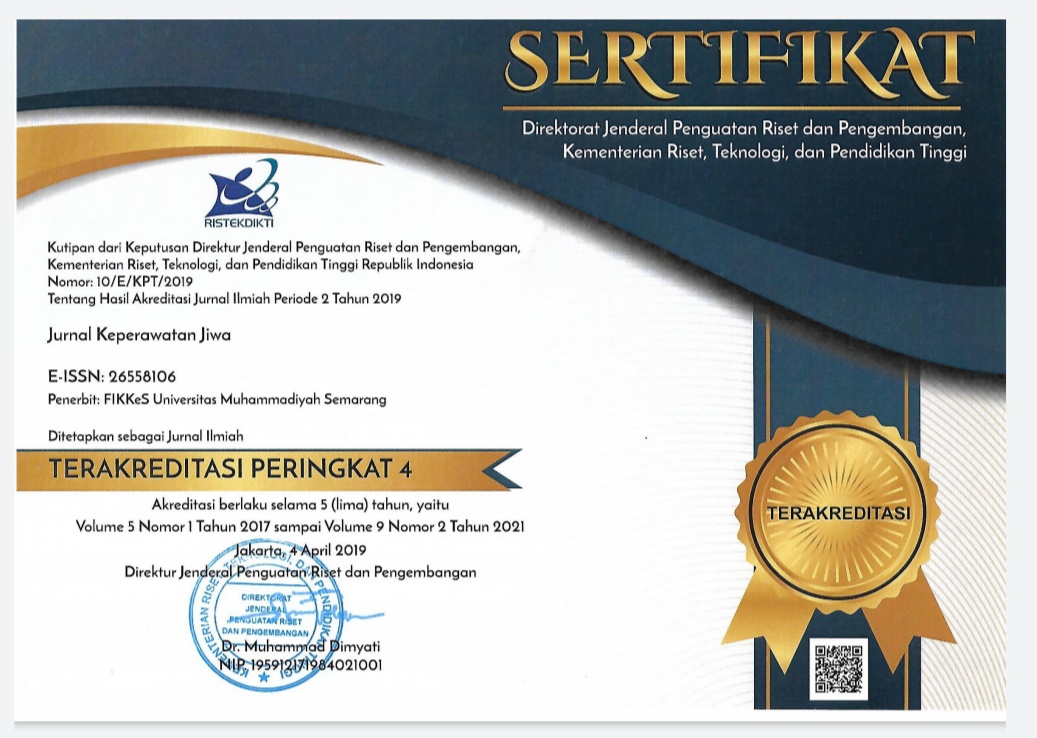Hubungan spiritualitas dan sensitivitas moral mahasiswa keperawatan
(1)
(2)
(3)
(*) Corresponding Author
Abstract
Spiritualitas sebagai sebuah keyakinan seringkali dikaitkan dengan hubungan transenden yang berdampak pada sikap dan perilaku individu, salah satunya sensitivitas moral dalam keperawatan. Sensitivitias moral merupakan ketentuan penting dalam praktik keperawatan dan menjadi tuntutan dalam memberikan pelayanan kesehatan secara holistik. Tujuan penelitian ini untuk mengidentifikasi hubungan spiritualitas dan sensitivitas moral mahasiswa keperawatan di Provinsi Bali. Penelitian kuantitatif dengan rancangan deskriptif korelasional ini mengikutsertakan 122 mahasiswa keperawatan di Bali sebagai sampel dan menggunakan teknik purposive sampling. Data dikumpulkan dengan menggunakan kuesioner data demografi, spiritualitas, dan sensitivitas moral. Penelitian ini memperoleh hasil bahwa terdapat hubungan antara spiritualitas dengan sensitvitas moral mahasiswa keperawatan di Provinsi Bali (r = 0.320, P<0,001). Hasil ini menunjukkan bahwa adanya hubungan yang lemah antara kedua variabel dengan arah hubungan yang positif dengan makna semakin tinggi tingkat spiritualitas mahasiswa keperawatan maka semakin tinggi sensitivitas moral mahasiswa keperawatan. Faktor-faktor lain yang dapat memengaruhi sensitivitas moral mahasiswa keperawatan perlu diteliti lebih lanjut.
Kata kunci: spiritualitas, sensitivitas, moral, keperawatan
SPIRITUALITY RELATIONSHIP AND MORAL SENSITIVITY OF NURSING STUDENTS
ABSTRACT
Spirituality as a belief is often associated with transcendent relationships that have an impact on individual attitudes and behavior, one of which is moral sensitivity in nursing. Moral sensitivity is an important provision in nursing practice and is a demand in providing health services holistically. The purpose of this study was to identify the relationship between spirituality and moral sensitivity of nursing students in Bali Province. This quantitative research with a descriptive correlational design included 122 nursing students in Bali as samples and used purposive sampling technique. Data was collected using demographic, spirituality and moral sensitivity data questionnaires. This study found that there was a relationship between spirituality and moral sensitivity of nursing students in Bali Province (r = 0.320, P <0.001). These results indicate that there is a weak relationship between both of variables with the direction of a positive relationship which means that the higher level of spirituality of nursing students then the higher level of moral sensitivity among nursing students. Other factors that can influence the moral sensitivity of nursing students need to be investigated further.
Keywords: spirituality, sensitivity, morality, nursing
Keywords
Full Text:
PDFReferences
Arsang-Jang, S., Khoramirad, A., Pourmarzi, D., & Raisi, M. (2017). Relationship Between Spiritual Intelligence and Ethical Decision Making in Iranian Nurses. Journal of Humanistic Psychology, 002216781770431. https://doi.org/10.1177/0022167817704319
Boonyamanee, B., Suttharangsee, W., Chaowalit, A., & Parker, M. E. (2014). Exploring moral sensitivity among Thai psychiatric nurses. 34, 9.
Borhani, F., Abbaszadeh, A., & Mohsenpour, M. (2013). Nursing students’ understanding of factors influencing. Iranian Journal of Nursing and Midwifery Research, 18(4), 6.
Escolar-Chua, R. L. (2018). Moral sensitivity, moral distress, and moral courage among baccalaureate Filipino nursing students. Nursing Ethics, 25(4), 458–469. https://doi.org/10.1177/0969733016654317
Hardt, J., Schultz, S., Xander, C., Becker, G., & Dragan, M. (2012). The Spirituality Questionnaire: Core Dimensions of Spirituality. Psychology, 03(01), 116–122. https://doi.org/10.4236/psych.2012.31017
Heggestad, A. K. T., Nortvedt, P., & Slettebø, Å. (2013). The importance of moral sensitivity when including persons with dementia in qualitative research. Nursing Ethics, 20(1), 30–40. https://doi.org/10.1177/0969733012455564
Hunt, G. (1997). Moral crisis, professionals and ethical education. Nursing Ethics, 10.
Jagger, S. (2011). Ethical sensitivity: A foundation for moral judgment. Journal of Business Ethics Education, 8(1), 13–30.
Kim, Y.-S., Kang, S.-W., & Ahn, J.-A. (2013). Moral sensitivity relating to the application of the code of ethics. Nursing Ethics, 20(4), 470–478. https://doi.org/10.1177/0969733012455563
Lützén, K., & Ewalds-Kvist, B. (2013). Moral Distress and its Interconnection with Moral Sensitivity and Moral Resilience: Viewed from the Philosophy of Viktor E. Frankl. Journal of Bioethical Inquiry, 10(3), 317–324. https://doi.org/10.1007/s11673-013-9469-0
Maddineshat, M., Yousufzadeh, M. R., Mohseni, M., & Maghsoudi, Z. (2019). Teaching ethics using games: Impact on Iranian nursing students’ moral sensitivity. Indian Journal of Medical Ethics, IV(1), 14–20. https://doi.org/10.20529/IJME.2018.056
Ohnishi, K., Kitaoka, K., Nakahara, J., Välimäki, M., Kontio, R., & Anttila, M. (2018). Impact of moral sensitivity on moral distress among psychiatric nurses. Nursing Ethics, 096973301775126. https://doi.org/10.1177/0969733017751264
Park, M. (2011). The relationship of ethics education to moral sensitivity and moral reasoning of students in baccalaureate nursing programs of South Korea. 166.
Park, M., Kjervik, D., Crandell, J., & Oermann, M. H. (2012). The relationship of ethics education to moral sensitivity and moral reasoning skills of nursing students. Nursing Ethics, 19(4), 568–580. https://doi.org/10.1177/0969733011433922
Rahnama, F., Mardani-Hamooleh, M., & Kouhnavard, M. (2017). Correlation between moral sensitivity and self-esteem in nursing personnel. Journal of Medical Ethics and History of Medicine, 10. Retrieved from https://www.ncbi.nlm.nih.gov/pmc/articles/PMC6150914/
Range, L. M., & Rotherham, A. L. (2010). Moral distress among nursing and non-nursing students. Nursing Ethics, 17(2), 225–232. https://doi.org/10.1177/0969733009352071
Schluter, J., Winch, S., Holzhauser, K., & Henderson, A. (2008). Nurses’ moral sensitivity and hospital ethical climate: a literature review. Nursing Ethics, 15(3), 304–321. https://doi.org/10.1177/0969733007088357
Widodo, W. N., Wungow, H., & Hamel, R. S. (2016). Hubungan peran ketua TIM dengan kinerja perawat pelaksana dalam pendokuemtasian asuhan keperawatan di IRINA F RSUP Prof Dr. R. D. Kandou Manado. JURNAL KEPERAWATAN, 4(2). Retrieved from https://ejournal.unsrat.ac.id/index.php/jkp/article/view/12871
Woods, M., Rodgers, V., Towers, A., & La Grow, S. (2015). Researching moral distress among New Zealand nurses: A national survey. Nursing Ethics, 22(1), 117–130. https://doi.org/10.1177/0969733014542679
Yanti, N. P. E. D., Handiyani, H., & Kuntarti. (2017). The Determinants of ethical principle implementation in nursing. Journal of Health Sciences and Medicine, 1(2), 16–22.
Article Metrics
Abstract view : 1264 timesPDF - 187 times
DOI: https://doi.org/10.26714/jkj.7.2.2019.153-160
Refbacks
- There are currently no refbacks.
PPNI Univ. Muhammadiyah Semarang
Jl. Kedungmundu Raya No. 18 Semarang Gedung NRC University of Muhammadiyah Semarang
Phone: 02476740287
Fax: 02476740287
Email: [email protected]
This work is licensed under a Creative Commons Attribution 4.0 International License.


